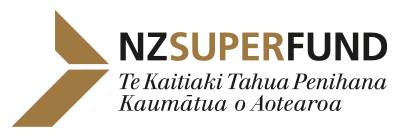Risk management
We believe having great culture, governance, people and processes is critical to managing risk.
Risk is an inherent part of any investment fund's operations. We know risk events will happen; our focus is on mitigating the likelihood of serious risk events and on ensuring we have the right mechanisms in place to respond resiliently should they occur.
Role of the Board
The Board sets the investment and enterprise risk appetite, provides governance and oversight, and regularly reviews the Risk Management Framework. They delegate authority to the CEO for managing risks, ensuring accountability and timely responses.
Risk Appetite Statement
The Risk Appetite Statement, set by the Board, outlines the approach to risk we take to achieve our strategic goals.
|
The Guardians of New Zealand Superannuation has developed into, and has a strong ambition to remain, a world class organisation with a purpose that reflects its intergenerational focus. In setting out its risk appetite the Board recognises that risk, internal and external, to its business is likely to come from a range of causes. For these risks, how we respond falls into four broad categories: Culture, Governance, People, and Processes. The Board is willing to take risk to achieve the Guardians’ Purpose; it expects the Guardians to continue to use all reasonable measures, without imposing excessive costs or constraints, for its management of the four categories. Our risk appetite will be determined by the Guardians’ Purpose and Vision, with Investment Risk managed by the adoption of the Reference Portfolio and approved Investment Constraints; and Enterprise Risk is managed by the Risk Assessment Framework. |
Role of Management
Management implements the Risk Management Framework ↗, ensuring compliance with the risk appetite. The CEO and team integrate risk management into daily processes and attest semi-annually to policy compliance. The Risk Committee↗ oversees enterprise activities, reviewing material risks and emerging threats.
Three lines of accountability
-
Business units: Primary responsibility for risk management with policies, procedures, and controls
-
Risk function: Provides independent advice, reporting, and challenge to enhance decision-making.
-
Internal audit: Offers independent assurance on compliance and effectiveness of risk management frameworks.
Risk Management Framework
Our framework includes systems, policies, structures, processes, and people to identify, measure, control, mitigate, and report risks. It ensures accountability across all teams.
Explore the Risk Management Framework. ↗
Risk Assessment Framework
This framework supports our risk appetite implementation, defining risk categories, setting core expectations, and ensuring appropriate monitoring and reporting.
Our framework:
- ensures the risk categories are defined
- sets out the questions we need to ask ourselves
- defines the Guardians' core expectations
- ensures there is appropriate monitoring and reporting of our risk appetite assessments.
Policies
Our policies ensure risks align with our risk appetite.
- Managing investment risk: Our approach to managing investment risk is set out in our Statement of Investment Policies, Standards and Procedures (SIPSP) ↗ and our Investment Risk Allocation Policy ↗. These are reviewed by the Board every five years.
- Managing enterprise risk: Our approach to managing enterprise risk is set out in schedule 1 of the Guardians’ Risk Management Policy ↗ and in our SIPSP ↗.
Culture and risk
We prioritise a strong risk culture to ensure we effectively identify, assess, and manage risks. Our approach is built on promoting an organisational culture that shapes our behaviours and values in response to risk. This culture reflects how much risk matters to us and enables us to deliver on our purpose.
Monitoring and reporting
Every six months, the Board receives an Enterprise Risk Report, highlighting strategic and emerging risks identified by our business units. Each unit maintains a risk register, with controls and action plans reviewed by the Risk Committee↗.
